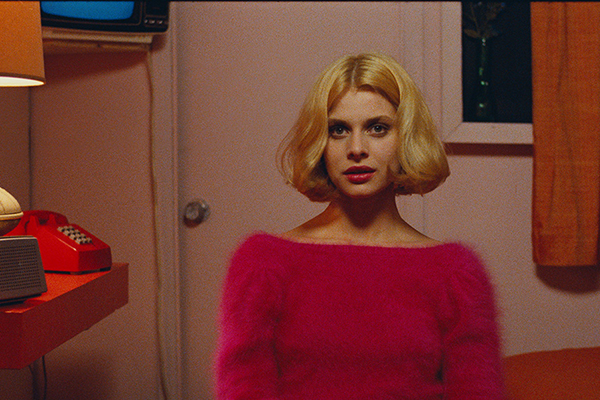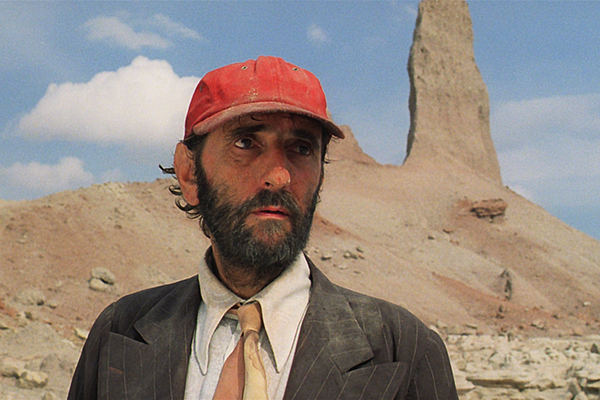Road Movie
Chronicle of an American dream
Posted on 18.10.2023
Exactly forty years ago, in the middle of the desert, Wim Wenders shot his best-known film, Paris, Texas, which won the Palme d'Or at the 1984 Cannes Film Festival. Recollections.
In 1983, Wim Wenders is 38 years old. To explain the serious young man he will become years later, he likes to quote two recurring lines from Bob Dylan's My Back Pages: "But I was so much older then, I'm younger than that now.” At the time, Wenders is living in Los Angeles and does not socialise much with the film world, just a small community of Germans. (He is best man at Wolfgang Petersen's wedding, and meets Udo Kier and Uli Lommel, who also live in LA). His friends tend to be painters and musicians, and Wenders is a keen follower of L.A.'s thriving music scene in the heyday of punk - "There’s always a live band playing somewhere, often The Gun Club or Minutemen..."
Just before publication, Sam Shepard, whose work Wenders admires and whom the latter would have liked to have cast as the lead in Hammett, sends him the manuscript of Motel Chronicles. The filmmaker is enthusiastic, sensing that he is on the verge of what could be his first "real" American movie, the kind he had been dreaming about since his days in “old Europe”. He takes notes for a screenplay, but Sam Shepard wants to distance himself from the book. While Wenders envisions a road movie stretching all the way to Canada, Shepard explains that Texas can suffice, that it encompasses all of America. They then agree on the story of Travis, who emerges from Mexico where he has been living for four years - four years of amnesia and muteness, perhaps. Travis’s backstory involves a love affair with Jane, a woman much younger than himself, which had ended badly. Travis, without a word, had abandoned everything - his wife and child, soon-to-be eight. And suddenly he returns, literally speechless, without a hint of an explanation…
 Paris, Texas, 1984 © Wim Wenders Stiftung
Paris, Texas, 1984 © Wim Wenders Stiftung
For Wenders, it is obvious that Travis will be played by Shepard. And yet it was not to be - Sam is already long gone... After a fateful encounter with Jessica Lange on the set of Frances, Shepard refuses to leave her side, even for the filming of his friend. For a long while, Shepard claims to have given up the role because it was a figment of his own imagination and he knew its inner workings too well. The truth, however, is even more sentimental: madly in love, Shepard manages to get himself cast alongside his beauty in Country and sets off to shoot in Iowa. Upon Shepard's advice, Wenders decides to give an “eternal” supporting actor a chance: Harry Dean Stanton. But Stanton has qualms: he is already 56 years old, whereas the script calls for a man who has been married for four years, and is a father of a soon-to-be eight-year-old son he had with Nastassja Kinski, who is 23... "I'm too old, too ugly. She's too beautiful..."
In August of 1983, it is 45° C (113° F); the heat is suffocating, unbearable. A small crew is filming the first shots of Paris, Texas- not yet called Paris, Texas - the first title, Motel Chronicles, has already been abandoned, the second, Wim has forgotten, "you’ll have to look at the clapperboard". Claire Denis is his faithful assistant. Wenders decides to film the quintessential American landscapes - the desert, the roads, the motels - as if seeing them for the first time, stripped of their cinematographic and pictorial references that had haunted the young film student, a heavy consumer of culture. No storyboards, no pre-cuts: now shooting, he and Robby Müller invent the film with a newfound innocence. Later, in post-production, the guitar of bluesman Ry Cooder would serve as a kind of background commentary.
Young Hunter, Travis's son, is played by Hunter Carson, who isn't eight years old, but is more mature than the average boy. His mother is actress Karen Black, his father actor and screenwriter L.M. Kit Carson. The former accompanies her son during the first few days, the latter then takes over, which will end up working out just fine.
Stuck in the middle-class house above Los Angeles airport, in an "American way of life" that still manages to seem highly undesirable, the film is at a standstill. How is Travis supposed to find Jane, his ex-wife? Wenders and Shepard had scrapped an ending that none of them believed in, where Jane was the daughter of a preacher – and they had imagined, albeit not very seriously, casting John Huston in the role. In any case another story must be rewritten, and Sam Shepard's absence is compromising everything. Wenders writes alone, then turns to Hunter Carson's father. Together, they add the departure of Travis and his son for Texas to the script.
Wenders sends the new scenes to Sam Shepard in Iowa by express mail; neither faxes nor the Internet exist yet... Shepard receives the deliveries and works on the dialogue. At night, he calls Wenders to dictate what he has written. Together, they conjure up the idea of an unorthodox peep show, where the girls listen to the clients, and in exchange can reveal themselves to a certain degree. It's there that Travis finally encounters Jane, first anonymously, then telling their story as a confession.
 Paris, Texas, 1984 © Wim Wenders Stiftung
Paris, Texas, 1984 © Wim Wenders Stiftung
Again, the heat is oppressive: the peep show is built in Port Arthur, Texas, a town Wenders is familiar with because Janis Joplin was born there. The subtle use of a one-way mirror - to see without being seen - forces Robby Müller to over- illuminate the reduced space of the booth in which Nasstasja Kinski performs in unbearable temperatures. The glass, like a screen, refers to the family screen of the super-8 films the family watched a little earlier, like a poignant reminiscence - "The wisdom of the young filmmaker had foreseen this", Wim Wenders admits today. The intensity of the performances and the monologues written by Sam Shepard do the rest. "I was pretty confident about the story, but now I knew that we had achieved something universal. The film had been in danger of not being finished, and now I was sure it was going to touch people."
On the day we caught up with him, Wenders was speaking softly, gathering his memories. "Paris, Texas changed my life, it marked a major turning point in my career. Before, nobody expected anything from my films. Afterwards, everyone expected a film of this calibre. I had to survive the shock of success!” The term "melodrama" is slipped in, a word that few had uttered at the time. He reflects. "When I was a student in Paris in the 60s, Pariscope had a 'melodrama' category. That was never my thing. I always thought the word was a bit pejorative, but maybe that's a bit stupid. Maybe it indeed describes Paris, Texas.”
Aurélien Ferenczi
SCREENINGS
Paris, Texas by Wim Wenders (1984, 2h28)
Pathé Bellecour – Wednesday, 18 October at 10.45am
Institut Lumière (Hangar) – Thursday, 19 October at 5.15pm
Comoedia – Sunday, 22 October at 4.45pm
Today, Wenders will introduce his two latest films:
Perfect Days by Wim Wenders (2023, 1h59)
Institut Lumière (Hangar) – Wednesday, 18 October at 9pm
Anselm by Wim Wenders (2023, 1h33)
Pathé Bellecour - Wednesday, 18 October at 4.45pm (tickets available directly at the movie theatre)
The screening will be followed by a discussion with Wim Wenders
At 8.15pm in the film festival village, Wim Wenders will sign the Blu-ray box sets of The Road Trilogy and Wings of Desire, published by Carlotta.

